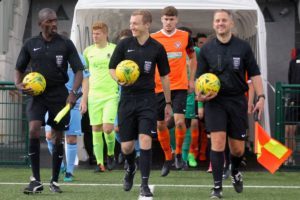Why Would Anyone Want To Be A Referee?
Football referees have one of the most heavily scrutinised jobs in the world. Once the thousands in attendance have made their feelings known about your workplace decisions, those watching elsewhere will take to social media to voice their opinions on just how badly you do your job, too.
Going an entire football match unnoticed is essentially the best-case scenario for a referee. When the expectation is to get every decision correct, applauding them for having a mistake-free game is like applauding a fish for swimming, in the eyes of many.
Add in the fact that they are paid a fraction of the athletes they share a pitch with, pursuing a career as an elite football referee seems a puzzling choice.
With this in mind, National League referee Jake Topp draws on his personal experience to help put the pieces together.

At 27, Topp is younger than many of the players he officiates on a weekly basis. Nevertheless, his refereeing journey began over a decade ago.
“When I started out I did it for the money. I could make about £130 from a weekend doing youth football which was the equivalent of doing 20 hours in a pub,” he said.
The money-making venture brought fresh challenges as Topp progressed through the early levels of the pyramid.
“I did my first men’s game when I was 16. I remember being terrified for it, I was the youngest person on the pitch by about five years and I was just expected to control these guys who were as old as my dad.
“Initially I thought everyone was staring at me because I was so young, but actually they just want to play football. Once you’ve got a couple of decisions under your belt it feels perfectly natural,” he said.
The next 11 years hammered home just how much referees have to go through to truly make it. Topp himself relocated from the South Coast to Manchester, partly due to the deep passion for football in the North West.
Although his hardships have not extended to physical abuse on the pitch, other referees have suffered in this regard, an unfortunate reality which the FA are fiercely trying to crack down on.
Despite this, Topp said: “People only view the referee as someone that gets shouted at for 90 minutes but there’s so much more to it than that. It’s like a bug, it’s almost a little bit addictive – when the lockdown happened in March I spent six months without it and I don’t think I’ve ever missed anything so much.”
The Hard Graft of Progression
Refereeing is a release for Topp, who balances elite-level officiating with a full-time job as an accountant during the week. Naturally, committing mentally and physically to both jobs is a challenge in itself.
“When you’re mentally drained after a long day and you have to go out in front of a couple of thousand people, it can be a challenge because you’re handling quite intense conflict – but it’s exactly the same as the players at that level, it’s just part of going up the pyramid.
“The more pressure I find on games the more I enjoy it – when you’ve got 5,000 people on your back it sharpens you mentally and it makes you much more alive. You could have stuff going on in your personal life, you could be having a bad day at work, but once you cross the white lines the only thing that exists is getting the next decision right,” he said.
Officiating regular matches on top of such a demanding job is all part of the hard graft of progression. Once at the top level, however, an improved salary allows referees to go full-time.
After 11 years, Topp has reached level three of ten, meaning he is still two promotions away from full-time refereeing. To go up a level, Topp will need to put in consistently good performances, judged by regular assessments during real matches, to gain promotion through a referee ‘league table’.
For now though, even refereeing at non-league level provides some unforgettable experiences.
In 2018, Topp was selected as the fourth official for a Manchester United reserves game at Old Trafford. Minutes in, the referee suffered a stress fracture in his leg, meaning he got the call up to take over the game.
Topp said: “It was probably the most surreal moment of my life as I’m running down the touchline warming up. The actual experience felt like being subbed on at Old Trafford. I remember feeling as though the stadium was just swallowing me.
“I was doing a long diagonal run keeping up with a United fast break, as I was going down the Stretford End I was just thinking, ‘Nobody is going to believe this’ but fortunately it was all on TV.
“Two days later I’m doing an FA Vase game in front of 75 people. I can just remember doing that game and thinking ‘I was booking Angel Gomes about this time two days ago.’”
Worth the Scrutiny
Anyone who loves football will have an appreciation for the magic Topp experienced that day. His run out at Old Trafford was preceded by a torrid day at work – aside from refereeing, Topp is a normal guy with a normal life, as are most of us in this world.
Only then does the magic and allure of refereeing start to make sense. After all, could there be a better way to express a love of football than to have a front row seat in a professional match every weekend?

Topp said: “First and foremost I love the game. You have instances where the play is so good that you are almost willing the finish to go in. You have that appreciation because of that old cliché that most referees are just failed footballers, that is the case with me.
“I see people do things on a football pitch and I think ‘wow I wish I could do that’.”
Indeed, this kind of admiration has given way to football writers, analysts, coaches and, of course, referees who work tirelessly to cement their position in the wider footballing world based on an undying love of the game.